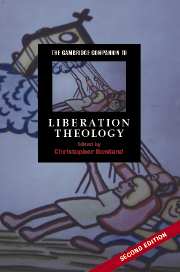Book contents
- Frontmatter
- Introduction: the theology of liberation
- Part I Contemporary Liberation Theology
- 1 The task and content of liberation theology
- 2 ‘Action is the life of all’: the praxis-based epistemology of liberation theology
- 3 Liberation theology in Asia
- 4 Black theology
- 5 Feminist theology: a critical theology of liberation
- 6 Demythologising liberation theology: reflections on power, poverty and sexuality
- Part II Aspects of Liberation Theology
- Part III Analysis and Criticism
- Epilogue: the future of liberation theology
- Select bibliography
- Index
- Series list
1 - The task and contentof liberation theology
from Part I - Contemporary Liberation Theology
Published online by Cambridge University Press: 28 January 2008
- Frontmatter
- Introduction: the theology of liberation
- Part I Contemporary Liberation Theology
- 1 The task and content of liberation theology
- 2 ‘Action is the life of all’: the praxis-based epistemology of liberation theology
- 3 Liberation theology in Asia
- 4 Black theology
- 5 Feminist theology: a critical theology of liberation
- 6 Demythologising liberation theology: reflections on power, poverty and sexuality
- Part II Aspects of Liberation Theology
- Part III Analysis and Criticism
- Epilogue: the future of liberation theology
- Select bibliography
- Index
- Series list
Summary
[Translated by Judith Condor] The urgency and the richness ofthe commitment that many Christians in Latin America and the Caribbean began tofeel in the 1960s as part of the struggle for justice and solidarity with the poorraised new questions, as well as pointing to fertile new pathways in the discourseabout faith. These circumstances helped convert such reflection into a theology ofliberation; that is, a way to understand the grace and salvation of Jesus in thecontext of the present and from the situation of the poor.
From the start, therefore, this theological perspective is bound up with the lifeof grassroots Christian communities and their commitment, as well as with theevangelising mission of the Church. This is the reason for its great impact, alsofrom the outset, in the magisterium of the Church. Medellín and other LatinAmerican Bishops' conferences, as well as many other texts, bear witness to thisfact.
The theology of liberation, like any theology is about God. God and God’slove are, ultimately, its only theme. But since for Christian revelation (thestarting point for any theology) the love of God is a mystery, the immediatequestion is how to talk of a mystery? The humble and respectful advice of ThomasAquinas remains valid: 'we cannot know what God is, only what he is not' (ST1.9.3 introd.) It is in this context that, nearly thirtyyears ago, we asked ourselves what path the theological task ought to take in thecontext of Latin America.
- Type
- Chapter
- Information
- The Cambridge Companion to Liberation Theology , pp. 19 - 38Publisher: Cambridge University PressPrint publication year: 2007
- 11
- Cited by

